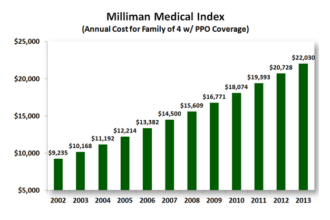Nowhere is it more important for employees to be on-point than in the medical industry. A marketing professional who falls asleep won’t usually kill anyone. He might kill the bottom line, but he’s not going to cost a life. In the medical industry, though, a distracted worker can bring about death and significant costs for the hospitals charged with protecting life. With this in mind, those in charge of running a medical staff must be proactive in keeping staff focused.
Nowhere is it more important for employees to be on-point than in the medical industry. A marketing professional who falls asleep won’t usually kill anyone. He might kill the bottom line, but he’s not going to cost a life. In the medical industry, though, a distracted worker can bring about death and significant costs for the hospitals charged with protecting life. With this in mind, those in charge of running a medical staff must be proactive in keeping staff focused. According to NOLO, the average award for an inpatient malpractice case is just more than $300,000. The stakes are high, so here are some good ways to keep staff focused.
Regulate the number of waking hours
One of the biggest problems for young workers in the medical industry is fatigue. Simply put, when people get tired, their judgment falters. They aren’t as good with their hands, which can lead to physical mistakes made on patients. They might also make poor choices because a lack of sleep can cloud judgment. Young residents and interns who are trying to impress the doctors around them are especially prone to these sorts of lapses. With this in mind, overseeing personnel should take steps to ensure that employees have enough sleep.
There are many ways of potentially accomplishing this feat. As mentioned, some regulation of the number of waking hours a person can work is a necessary first step. Beyond that, it pays to make sure that employees have a place where they can lay down and rest. This is not possible unless the hospital has a sufficient number of staff members to cover for a person who needs to get off his or her feet. With this in mind, hospitals and overseeing staff should make sure that they have backup options in place in case they need to send a person off of the floor.
Prohibitions on chatting
Medical professionals are like anyone else in that they like to get to know the people around them. As with any profession where people work closely together for so many hours, there are going to be times when office drama and politics come into play. Smart hospital managers will put into place measures to keep people from wasting their time with meaningless conversations. By doing so, these overseers will be able to keep the focus on the work. While it’s not exactly possible to keep people from all talking, strict rules on office gossip can curtail some of the things that take people off track.
Restrictions on technology
In medical offices, personnel are prone to texting and browsing their favorite social media sites while on the clock. The good news is that hospital overseers can now put into place technology to limit the ability of individuals to access these time-wasting websites.
Blue Coat is one of a few companies currently providing restrictive software that keeps medical professionals from accessing certain apps on their phones. The aptly named Anti-Social is another product that blocks out these distractions. Office overseers who utilize these technologies can help to keep their employees on track during the course of a day. It only takes a few seconds for a person to get caught up in checking Facebook or Twitter. Once that happens, that person might miss important information that could lead to poor quality of care.
Without good software, it is almost impossible to convince people to give up what they’ve been using without consequence for so long now. Technology has changed the game, though, giving managers and lead personnel a quick and easy way to send a message that social media sites are for personal time rather than professional time. With these technologies, officer overseers don’t have to continue repeating themselves. They can just set the technology and let it do its job.





